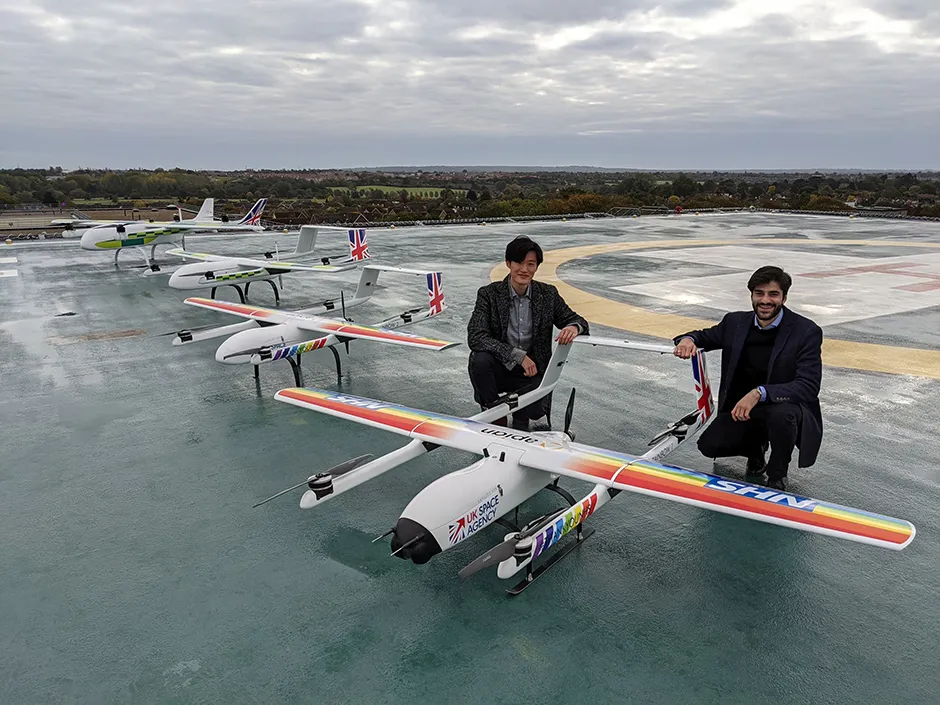A medical drone delivery service that makes it possible for the machines to carry COVID-19 samples, test kits and personal protective equipment between hospitals has been backed by the UK Space Agency.
Apian, which was founded by NHS staff as part of the NHS Clinical Entrepreneur Programme, aims to establish a network of secure air corridors for electric drones to navigate via satellite-enabled GPS.
Using the drones to help in the COVID-19 response will avoid courier call-out waiting times, free up NHS staff, reduce unnecessary physical contact and minimise the risk of secondary transmission of the virus. The drones will travel at around 77kph (48mph).
The project will be based at Broomfield Hospital in Chelmsford, part of Mid and South Essex NHS Foundation Trust, and will be supported by the local Anglia Ruskin University as the academic partner.
Read the latest coronavirus news:
The hospital stands on a First World War Royal Flying Corps airfield.
“COVID-19 has highlighted challenges in NHS supply chain logistics. There has never been a better time to create a faster, more dependable and environmentally friendly method of transporting medical supplies," said Christopher Law, from Apian.
“We are confident that by setting up a medical drone delivery service, we’ll be able to fly samples to labs more regularly, reliably and quickly, improving patient health outcomes.”
The start-up company was founded by Law and Hammad Jeilani, trainee doctors at the Barts and The London as well as Mid and South Essex NHS innovation fellows.It is installing drone pad infrastructure so its aircraft can take off from and land at hospitals, laboratories and warehouses.
The company will scale the work from its drone trials by creating the UK’s NHS Air Grid (NAG), a network of secure air corridors designed to safely, rapidly and effectively enable drone delivery across the NHS.It is working closely with the Civil Aviation Authority, UK Space Agency and the emergency services to create these corridors.
The drones, which can carry a maximum weight of 2kg and fly about 96km (60 miles), will fly at 90m above ground level and are designed to fly in harsh weather. They are a hybrid drones, which means they have the rotors of a typical drone and the wings of a plane, making them very good at flying long distances.
The drones will initially be flying between Broomfield Hospital, Basildon Hospital and the Pathology First Laboratory in Basildon.The flight path from Broomfield Hospital to the Pathology First Lab is 22km and takes just under 17 minutes, whereas the drones will travel 11.5km from Basildon Hospital to Pathology First in just over nine minutes.

The medical drones are being piloted by former RAF and Royal Navy fighter pilots from the York-based unmanned aircraft training company Flyby Technology.
“It’s a privilege for the British Drone Consortium to be called upon in the NHS’s hour of need," said Flyby Technology founder and former RAF pilot Jon Parker.
“The drones are supplementing current logistics, keeping the testing machines operating to capacity. This makes the whole system more efficient, bringing to bear the full capacity of the testing infrastructure.
What are the most sophisticated drones capable of?
Asked by: Tom Fisher, Leeds
Drones are radio-controlled flying gadgets with several propellers that may be used for filming, racing, and in the future perhaps even widespread delivery of parcels.
Military drones resemble small aircraft with no pilots. Some can take off, fly and land by themselves. They can perform surveillance over enemy territory or even deploy missiles to attack specific targets in dangerous places where we may not want to risk human pilots.
One of the most advanced today is the Taranis, a UK-built drone with a top speed of 1,127km/h (700mph) and 9.7m wingspan that is nearly invisible to radar.
Read more: